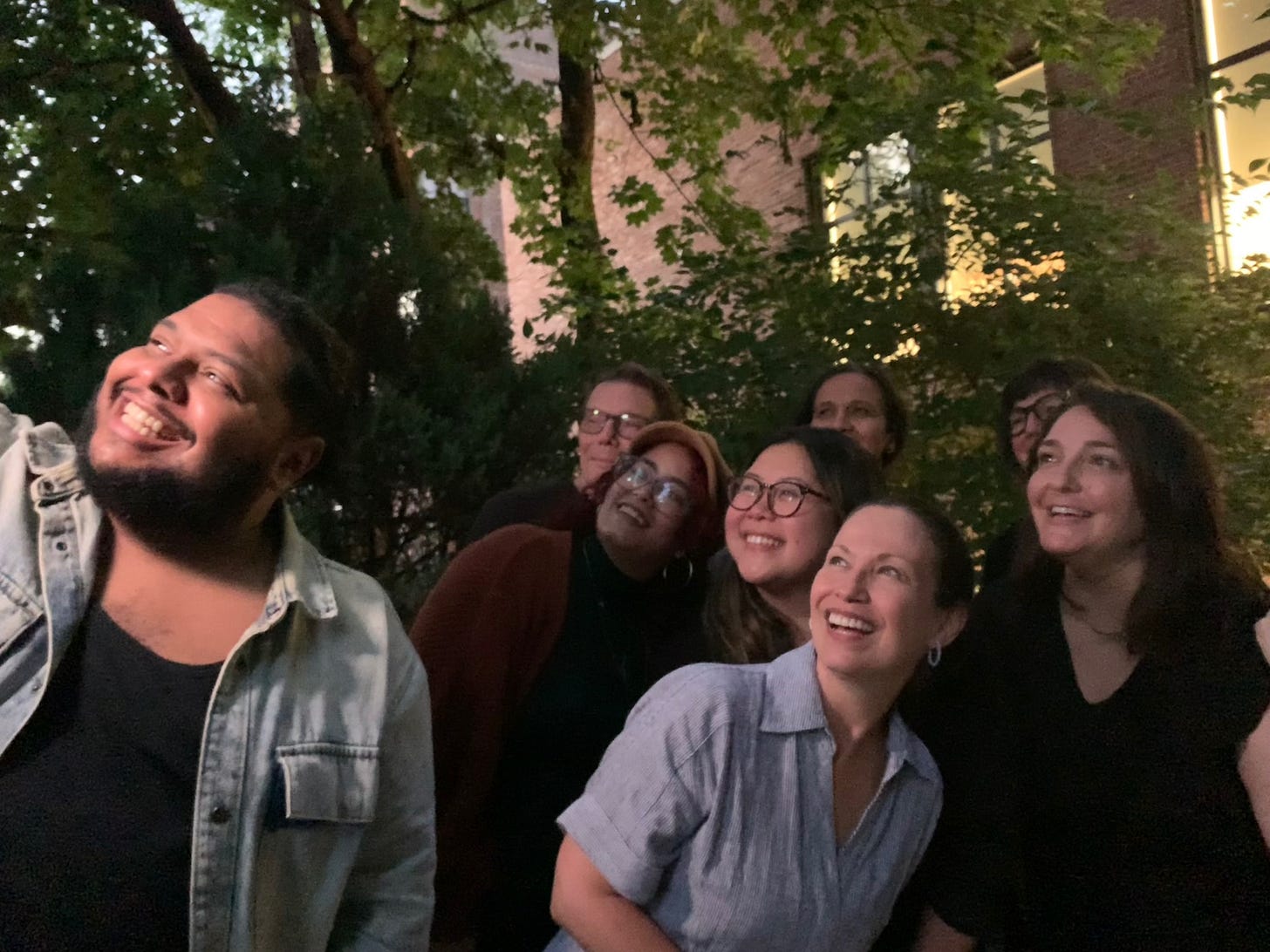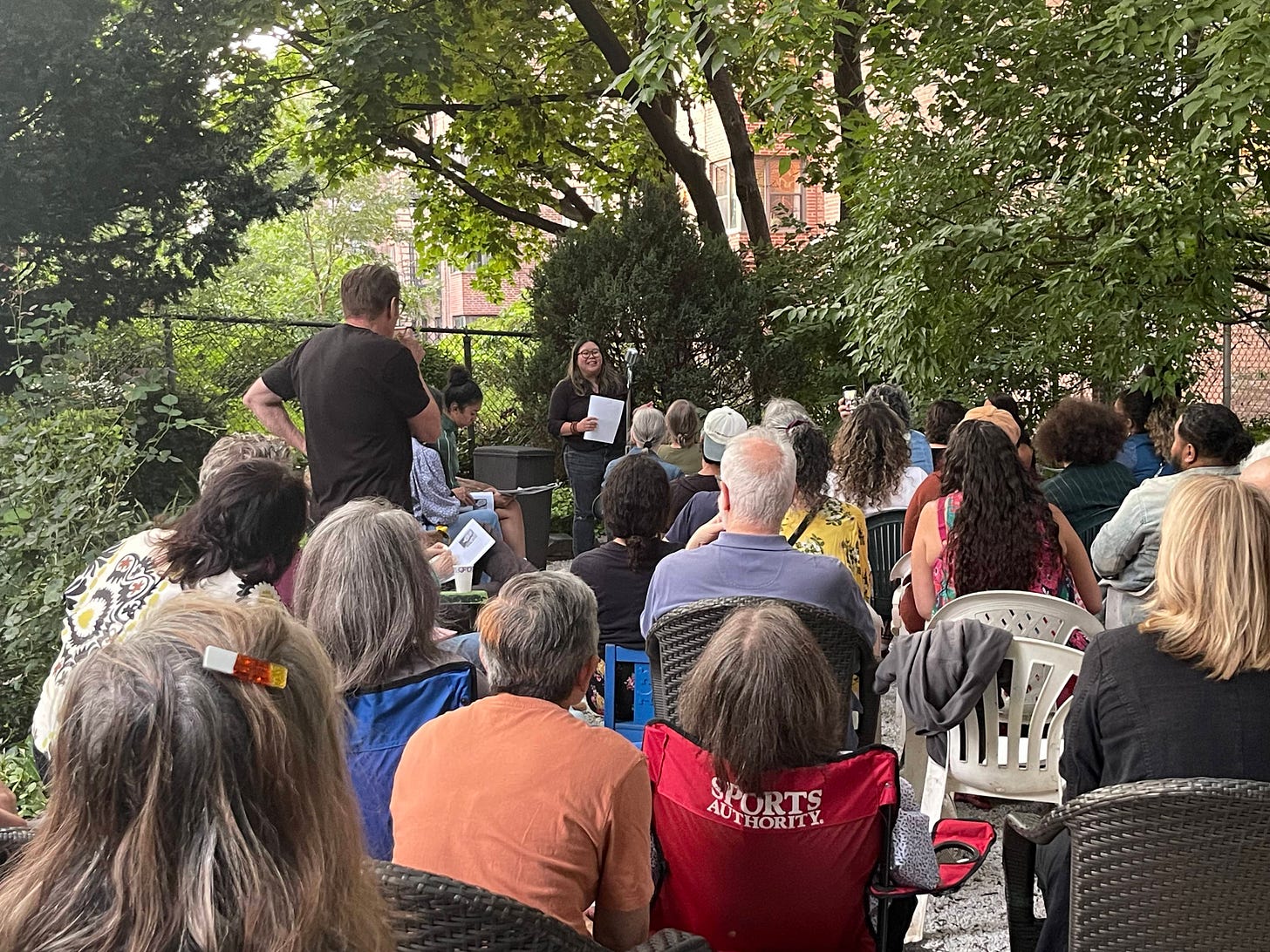On imposter syndrome and poetry
Sharing my work at a recent community reading allowed me to practice letting go of those nasty thoughts in my head
I had the pleasure of reading some of my work this past week at Bruce’s Garden in Inwood. The community event, LOGOPHILE, was organized by my dear friend and incredible writer
.When she invited me to participate, she said the evening would be a night of poetry and prose and I hesitated at the idea of sharing my poetry. As I shared that evening — I do write poetry but I don’t consider myself a poet. My poetry was nothing more than my emo feelings in google doc form; it didn’t embody the technical prowess that I admire in Ocean Vuong or Louise Glück
But like most writers, I am in love with language, the way words work in symphony and or discord with each other; how a a break of a line, in punctuation, in rhythm can evoke a certain emotion, propel your imagination, or create a sensory experience.
Buuuuut, I’m not a poet…right?
Right before the event, I texted Carla and asked if anyone was attending who could influence what I should read. As I continue to work on my book proposal and am trying to get my essays out into the world, I wanted to be strategic about what I shared. I told myself, my poetry might not be the best representation of who I am as a writer, it might be “off brand”, it might be not great.
Carla responded right away, telling me that she’d love to hear my poetry, that it was a warm community where my work would be well-received. And there wasn’t anyone there that I needed to tailor or edit my work for, and to just show up as my whole self, as the whole writer that I was.
I continued to sit with the discomfort I felt at sharing my poetry. I eventually decided to share four poems that night and felt very held by everyone, feeling empowered by my words. Shortly afterwards, Carla said “I told you so” in the most loving way possible and kindly reminded me to get rid of whatever imposter syndrome that was taking up space in my head, rent free.

Getting rid of imposter syndrome
We live in a society and world where we are told quite often that we are not good enough. And depending on the identities you hold, you might hear and feel this more often and might not even realize it. That’s definitely what happened to me. Who said I couldn’t be a poet?
As I continue to navigate how to transform this part of me, here are three tips and tricks that have helped me through the years:
Neutralize those thoughts: Whenever a thought comes through your head that reinforces the idea that you’re not good enough. Just simply notice and let it go. Inhale, notice. Exhale, let go. The work here is not to create a different narrative — but simply just to notice. As Brother Phap Linh says, “Once we bring awareness to things, they change.” The best way to practice this? Getting to the cushion every day and meditating. This is the pathway to incremental change — one breath at a time.
Name that voice in your head: Create some distance between you and your thoughts so that you can more easily identify these as what they are — your thoughts, not you. Don’t take them on as anything more than that. Or you can even take it a step further and create a full blown persona of what your imposter syndrome might be like as a character and describe and name them, as
often recommends at Narrative Healing.Create reminders for yourself: Sometimes it can be hard in the moment to remember what and how to get rid of the awful thoughts that are weighing you down. So try creating reminders for yourself outside of your mind — anything form leaving post-its around and/or telling a friend you’re really struggling with this and have them remind you differently. Again, you don’t have to believe it, and you probably won’t for awhile, but just allow yourself to stop those thoughts from deeply penetrating your psyche.
All of these practices are baby steps towards creating new neural pathways in your brain, to give you the spaciousness to dig deeper and ask where those thoughts come from, to transform the root of your limited beliefs. My hope is that these practices are the beginnings of transforming your imposter syndrome into your biggest cheerleader, one that will be relentless in its faith of you and your abilities.
And in an effort to practice what I preach, I’m sharing one of my poems. And even though that little imposter syndrome voice in my head is still present, it’s a bit quieter after this week.
Thanks for being a part of my practice space 🙏 and let me know in the comments how you navigate imposter syndrome and what you do to get those ugly thoughts out of your beautiful brain.
Picking out thorns
Loose pebbles underneath
the painted white line stab
the heels of my feet through
my shoes. And I continue walking
towards the dust that you left behind.
Hoping that this time will be different—
that you
will be different.
But I know
your misleading smiles
and affection have
fooled me again.
Car exhaust congests my lungs.
I can no longer breathe.
I stop at the end of our street
and slowly suck in the cold air
till my throat burns.
I look at the other houses—
gray bricks and rectangular design—
the same as ours, except
happy silhouettes laugh and dance inside
while I am left arguing with your shadows.
I clench my teeth and run through
the yellow grass to pick up a dead
pinecone, hurling it at
the house across from
ours.
Then, I cry
beneath the neighbor’s tree,
picking the thorns
out of my hand.





I love you and your words, and I told you so. 🥰
Sorry I had to miss out on your readings this time around. Love this poem, Kim!